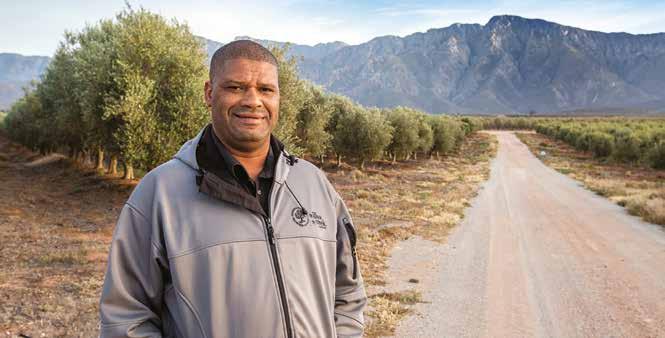
3 minute read
OUTENIQUA INFORMATION DAY focusses on forage herbs for milk production
by WCDOA pubs

by Annelene Swanepoel, annelenes@elsenburg.com
TThe popular annual Outeniqua Information Day was held in September at the Outeniqua research farm near George. The theme of the day was “Milk production from planted pasture” and the focus was on the inclusion of the new higher-yielding forage herb varieties in the fodder flow of dairy enterprises in the Southern Cape.
The pasture component was represented by pasture scientists Sigrun Ammann and Janke van der Colf. Sigrun presented results from cultivar evaluation trials on ryegrass, tall fescue and forage herbs and Janke introduced her new farm system study on the development of dairy systems based on forage herb pastures in the southern Cape.
Robin Meeske, animal sciences professor and dairy specialist, presented results of his study on high-fibre concentrates for cows grazing plantain and ryegrass. One of his MSc students, Rainier van Heerden, presented results of his study on supplementing protected methionine and lysine to cows grazing ryegrass pasture in spring.
The organising team also hosted Stephen Bennett from Lincoln, New Zealand, the international manager for PGG Wrightson Seeds Ltd, as a guest speaker.
Stephen has over 30 years’ experience working in the seed industry in both domestic and international roles, of which he spent 22 years at PGG Wrightson Seeds. It is a subsidiary of the global seed company DLF, the largest forage seed company in the southern hemisphere, and is the parent company of Agricom, the company responsible for the development and introduction of Tonic plantain as a forage herb. Stephen has visited South Africa on 12 occasions and has gained an understanding of farm systems throughout the country.
He has extensive knowledge of pastoral farming and seed production around the world and he is involved in agronomy, advising farmers on the use of pasture and forage products to maximise farm productivity. His presentation was on plantain as forage herb, sharing the New Zealand perspective with the 224 delegates attending.
The presentations were concluded with a panel discussion led by Sigrun Amman, with Stephen Bennett and three local farmers currently using plantain as part of their fodder flow. The discussion around plantain focussed on the establishment, grazing management and contribution to the dairy farming system. The farmers who participated were George Kuyler from George, Philip Muller from Geelhoutboom near George and Gert Byleveld from Rheenendal near Knysna.
After concluding remarks and a vote of thanks to the department for the research executed at Outeniqua by George Kuyler, the day was concluded with a tour to the research trial sites of the forage herb cultivar trials, the systems trial comprising plantain, tall fescue and mixtures, and also the trial of another MSc student, Zander Pretorius, on plantain and high-fibre concentrates.
A book containing the research results of all these trials was distributed and will also be made available later, electronically, on elsenburg.com, and by request to Janke van der Colf (jankevdC@elsenburg.com). Articles on the pasture systems and on the panel discussion will also be published in the popular media by Van der Colf and Ammann, respectively.
The Outeniqua research farm celebrates 66 years of excellence this year. Internationally renowned for its high-quality dairy and pasture research, Outeniqua is continuously growing – in terms of outputs and cutting-edge technology. The research group is heading one of the flagships of the Western Cape Department of Agriculture. It is the only pasture and dairy research group of its kind in the country, resulting in Outeniqua being our centre of excellence for pastures-for-dairy research.
Scientists at Outeniqua have played a leading role in the development of pasture management practices, pasture systems and over-sowing of pastures in the southern Cape. It is also the only research institution with a pasture and animal capacity and infrastructure to carry out research on a scale at which animal production and economics can be evaluated and a benchmark be set for producers. Research is producer-driven and plays a key role in technology development. It also plays a role in demonstrations for smallholder farmers and the fulfilment of their skills development in search of sustainability and profitability. Scientists can adjust existing research done for commercial farmers to suit the needs of smallholder farmers.
Outeniqua has also become a human capacity development hub where postgraduate students from various tertiary institutions are mentored while executing research projects for the department.
Despite the overwhelming challenges facing dairy farmers, research remains focussed on minimising input cost while optimising yield. In addition to this, sustainability and resource conservation has now also been added to the portfolio of research projects. AP


DDie Outeniqua navorsingsplaas van die Wes-Kaapse Departement van Landbou spog al vir jare met toekennings vir sy toonaangewende navorsing oor aangeplante weidings en melkproduksie, en sy kwaliteit melkkudde met 380 koeie in melk wat as ’n besonders waardevolle navorsingskudde dien.
Gedurende die pas afgelope George Skou wat gedurende Augustus aangebied is, het die navorsingsplaas met vyf koeie en vyf verse deelgeneem aan die Outeniqua jerseykampioenskappe. Die Outeniquaspan het baie moeite gedoen om diere uit te soek en voor te berei vir die skou. Die uitslae was uitstekend met drie eerste, vier tweede en twee derde plekke in verkillende klasse. Die hoogtepunt was Tes 34 wat die kategorie Reserwe Senior Kampioenkoei gewen het. Die Outeniqua navorsingsplaas het ook die Nestlé wisseltrofee vir die beste groep koeie op die skou ontvang. Hierdie trofee is ook in 2016 aan die plaas toegeken. Die jerseykudde het uitstekend meegeding met ander jerseykuddes in die streek en is ’n aanduiding van die uitmuntende wyse waarop hierdie navorsingskudde bestuur word.












